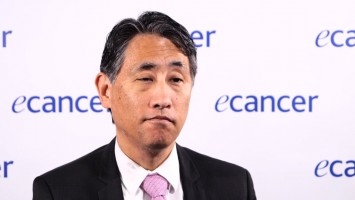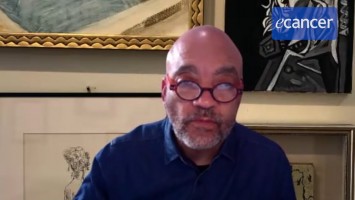ASCO 2010 Annual Meeting, 4—8 June 2010, Chicago
Interview with Professor Wendy Parulekar (Queen’s University, Canada)
The impact of radiotherapy on patients with high risk localised prostate cancer
Welcome to ecancer TV and thank you very much for taking a break from this busy ASCO. Now, we interviewed Malcolm Mason from the UK about the big prostate trial which has been presented here all over the newspapers; it’s a global study, or a North American/European study and you represent the NCIC, National Cancer Institute Canada, bit of that. Tell us a bit about yourself and NCIC at Kingston.
A pleasure, thank you for giving me this opportunity. I work for the NCIC Clinical Trials Group, we’re a non-profit, non-governmental organisation. We conduct clinical trials in cancer, both hematologic and solid tumour malignancies. We’re located in Kingston, Ontario, Canada between Toronto and Montreal.
So you’re a breast cancer practitioner and a medical oncologist and you’re also in charge of a lot of the supervision of a lot of the trials - the data collection, analysis and so on. Is that about right?
That’s a nice summary, yes. I am the project leader on a number of national and international studies; my portfolio includes genitourinary malignancies, breast cancer as well as head and neck cancer.
So tell us about the prostate study.
Well briefly, this is a study that we started in collaboration with other groups, such as the Medical Research Council and Southwest Oncology Group, in 1995. We accrued 1205 patients from 1995 to 2005 and the results that are being presented at ASCO here represent an interim analysis on overall survival.
So it’s interim analysis, we haven’t even reached the end of it yet? You’ve been going for fifteen years.
It’s actually the Data Safety Monitoring Committee, which oversees this study, felt the results were important enough to disclose to the medical community and patients as well.
Why?
Well, this study asks a fundamental question: what is the impact of radiotherapy in patients with high risk prostate cancer? We randomised patients to either hormone therapy lifelong, or hormone therapy with radiotherapy and, to tell you the truth, until recently that question has never really been answered although radiotherapy may have been used with different frequencies in different prognoses up until now.
And what happened?
Radiotherapy improves outcome. So we found an improvement in overall survival; that there was a 23% decrease, really, in the risk of dying and also a 43% decrease in the risk of dying from prostate cancer.
That’s a big difference.
Absolutely.
I can see why your Data Monitoring Committee got excited about that. And why do you think is the radiotherapy working? Local control matters?
Yes, local control does appear to matter.
We medical oncologists don’t always rate local control maybe as highly as we should, but here is a fabulous advertisement for local control. So this wonderful, simple, urology-driven hormone treatment has got to go out of the window. Do you think this is now standard medicine?
Well it’s certainly one of the treatment options. This is the largest study in this group of patients that shows that there is a difference and really in practices where radiotherapy is already being given, this allows the practitioner, as well as the patient, to really understand what the options and the outcomes are. For those practices that use, really, just hormone therapy, now is the time to start discussing radiotherapy as an option.
So even giving radiotherapy later on to a patient who has had hormone therapy, let’s say for a year, two years, you would still advocate that?
We don’t know that cancer.
OK, that was a careful response. So just say one more time – the gold standard care for men with localised prostate cancer but high risk is, according to your study…?
To consider radiotherapy in combination with hormone therapy.
Well that’s terribly important and I hope that people watching this all over the world will change their practice if they’re not already doing this. So tell me about the other interests you have and the other things that you’re interested in here at ASCO.
There are a lot of important results that are being treated. My primary focus at this point really was the genitourinary symposium so in addition to the PR3 results we heard about the French results with a similar patient population looking at a biochemical endpoint. We were also able to look at antibody therapy for patients with advanced or castration-resistant prostate cancer with skeletal related events already being treated with zoledronic acid. I think those are important results and are really advancing the field of treatment for prostate cancer.
So that’s another shift of care, do you think? Addition of zoledronic acid, you think that data is as chunky and as big as your data on the radiotherapy hormone trial?
I like to focus on the trial that we did. I think that our trial has a global impact which is what makes it so important. This group of patients really still exists, it might be about 15-25% of patients that are currently diagnosed with prostate cancer. In addition to that, in many countries radiotherapy is an accepted modality or available modality and so this has the real opportunity to save many, many lives.
And probably many more lives than many of the sexy targeted treatments that are being banded around with two months improvement in progression free survival, which is negligible if you’re the patient who’s getting that two months. A very important result and I’m very, very pleased that you took some time to tell us about it.








![Upfront [177Lu]Lu-PSMA-617 radioligand therapy prior to radical prostatectomy in men with HR PC ( Dr Renu Eapen - Peter MacCallum Cancer Centre, Melbourne, Australia )](https://cdn.ecancer.org/44737-m.jpg)